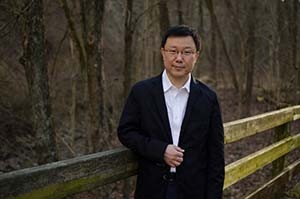
Friction Nonfiction: NSF Recognizes UC Engineer's Graphene Research with Grants
For a society that is heavily dependent on energy, a fraction of friction makes a world of difference.
Many times, friction is a good thing as it can be used to generate electric energy. But in things like machines, nanoscale friction is a villain. Increased friction causes increased wear and tear on machinery, leading to more frequent machine replacements and repairs. In the latter case, friction is a primary mechanism of energy waste, so reducing its effects could have a great impact on energy sustainability.
A study showed that 1.3 to 1.6 percent of an industrialized nations GDP (gross domestic product) is lost due to friction, University of Cincinnati professor Woo Kyun Kim said. For the United States, this corresponds to about $300 billion dollars in 2015. Thus, I want to better understand friction and wear, which will in turn have significant positive impacts on the national economy.
Kim is an assistant professor of mechanical engineering in UC's
College of Engineering and Applied Science
. He serves as principal investigator for two
(NSF) awards to gain an enhanced understanding of friction and lubrication solutions that will pave the way for the realization of frictionless sliding on macroscopic scales.
Kims first NSF project, titled Collaborative Research: Accelerated Large-Scale Simulation Study of Atomic-Scale Wear Using Hyper-Quasicontinum, totals $201,645 and focuses on the nano-scale wear of friction. The grant began in July of 2015 and runs through June 30, 2018.
His second NSF project, titled Accelerated Molecular Dynamics Study of the Role of Crystalline Defects in Friction of 2-Dimensional Materials, furthers and applies the research findings of his first grant, and is aimed at studying the friction of graphene. This award totals $324,555 and runs July of 2017 through June 30, 2020 (estimated).
The ultimate aim of these projects is to develop a novel predictive model for nanoscale wear and furthermore find a solid lubricant to reduce friction and the nano-wear of devices. Kim believes graphene would be an ideal solid lubricant as it has thickness on the atomic scale.

Computer simulation model of AFM (atomic force microscope).
Kims research uses computer simulations to investigate fundamental material properties and behaviors. When he investigates friction and wear from the very small scales of atoms, Kim observes how they move and interact in computer simulations.
I am very excited to be awarded two NSF grants, which is indicative of the national recognition of my research, Kim said. I'm very confident that these research outcomes improving lubrication on a microscopic scale to decrease mechanical wear will benefit society, lead to advances in nanotechnology and save the U.S. economy up to $241 billion per year.
Kim joined UC's Department of Mechanical and Materials Engineering in 2014. He is from South Korea, where he received his masters degree in mechanical engineering at Seoul National University and worked in the New Gasoline Engine Development Team at Hyundai Motor Company. He completed his PhD in mechanical engineering at the University of Michigan.
Related Stories
UC celebrates Earth Day with greener, bolder moves
April 18, 2025
This year, UC’s Earth Day celebration honors a growing portfolio of eco-conscious achievements that stretch across the main and regional campuses. In a university-wide effort that bridges environmental science, design and community action, Bearcats are proving that green isn’t just a color — it’s a culture.
UC team wins national championship in disc golf
April 18, 2025
Cincinnati news media highlight UC's disc golf team which won the national championship for the second time in three years.
Engineer transitions from industry to innovation at UC
April 16, 2025
Prior to coming to the University of Cincinnati, Adonai Vera Gonzalez worked in industry for six years, holding a variety of positions related to artificial intelligence. He connected with UC Professor of Aerospace Engineering Donghoon Kim and began a Master of Engineering program at the College of Engineering and Applied Science. He won first place in the AI ATL hackathon for a generative AI project.
